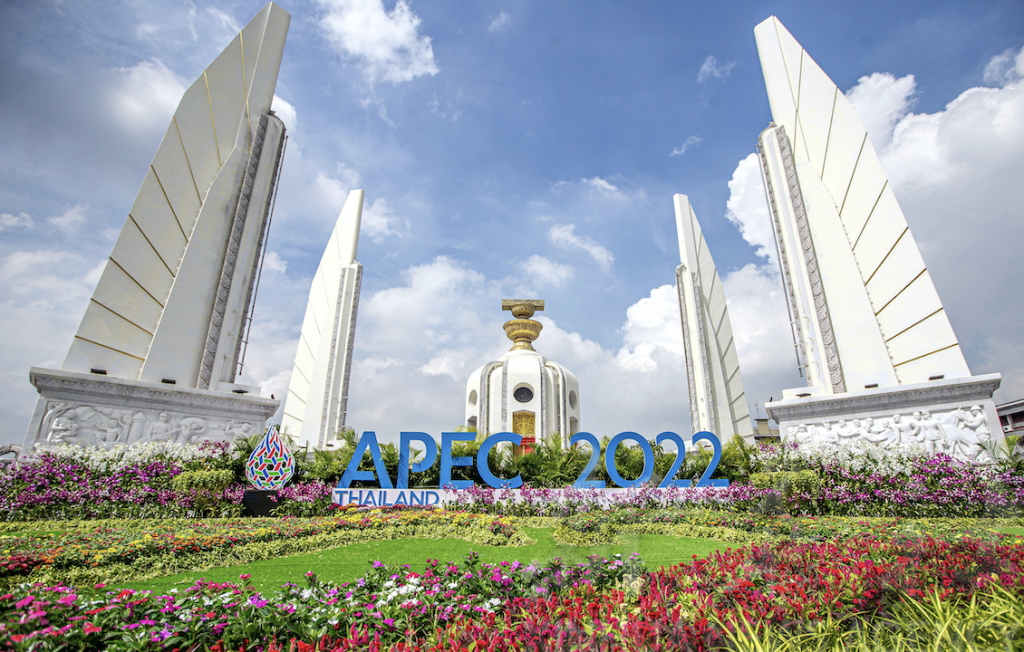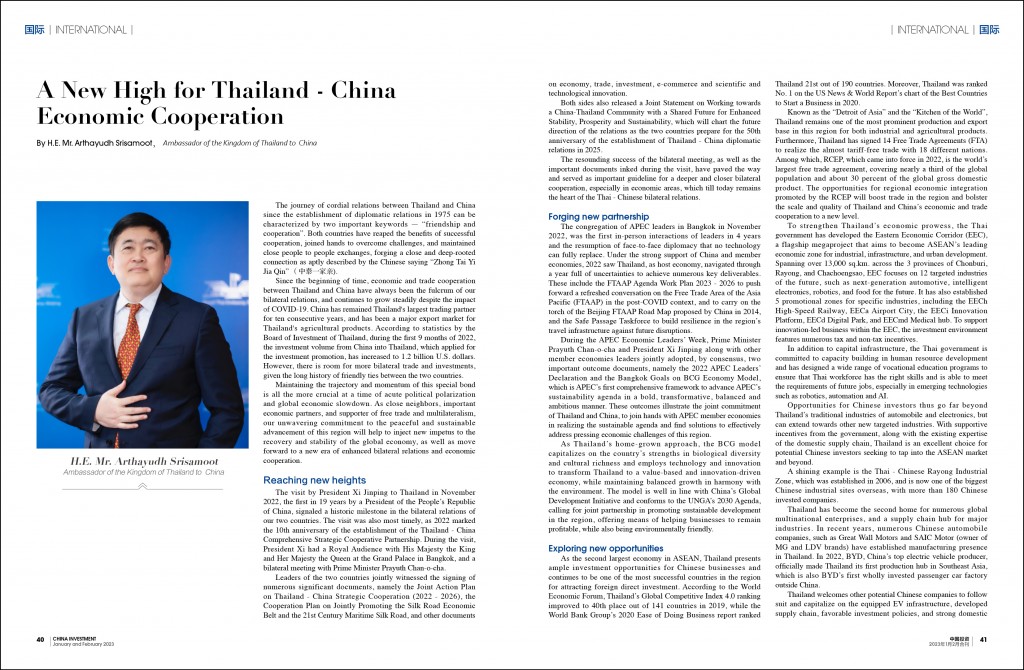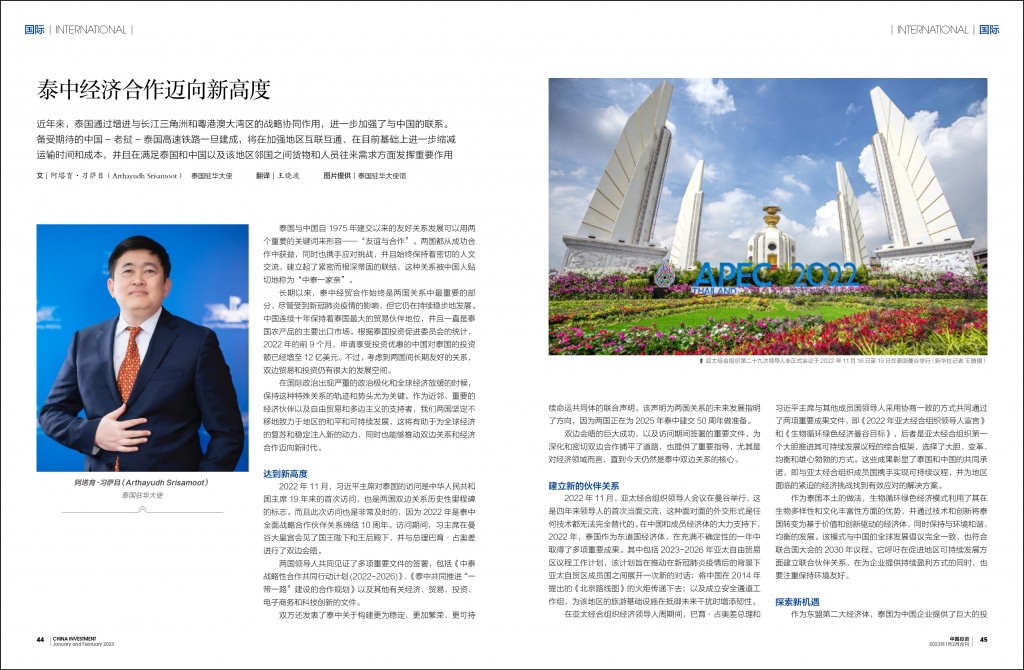By H.E. Mr. Arthayudh Srisamoot, Ambassador of the Kingdom of Thailand to China
文|阿塔育·习萨目(Arthayudh Srisamoot) 泰国驻华大使 翻译|王晓波 图片提供|泰国驻华大使馆
导读
●达到新高度
●建立新的伙伴关系
●探索新机遇
●神奇的新篇章
●注入新活力
●绘制新路径


⬆ Famous Tourist Destinations in Thailand
The journey of cordial relations between Thailand and China since the establishment of diplomatic relations in 1975 can be characterized by two important keywords — “friendship and cooperation”. Both countries have reaped the benefits of successful cooperation, joined hands to overcome challenges, and maintained close people to people exchanges, forging a close and deep-rooted connection as aptly described by the Chinese saying “Zhong Tai Yi Jia Qin” (中泰一家亲).
Since the beginning of time, economic and trade cooperation between Thailand and China have always been the fulcrum of our bilateral relations, and continues to grow steadily despite the impact of COVID-19. China has remained Thailand’s largest trading partner for ten consecutive years, and has been a major export market for Thailand’s agricultural products. According to statistics by the Board of Investment of Thailand, during the first 9 months of 2022, the investment volume from China into Thailand, which applied for the investment promotion, has increased to 1.2 billion U.S. dollars. However, there is room for more bilateral trade and investments, given the long history of friendly ties between the two countries.
Maintaining the trajectory and momentum of this special bond is all the more crucial at a time of acute political polarization and global economic slowdown. As close neighbors, important economic partners, and supporter of free trade and multilateralism, our unwavering commitment to the peaceful and sustainable advancement of this region will help to inject new impetus to the recovery and stability of the global economy, as well as move forward to a new era of enhanced bilateral relations and economic cooperation.
Reaching new heights
The visit by President Xi Jinping to Thailand in November 2022, the first in 19 years by a President of the People’s Republic of China, signaled a historic milestone in the bilateral relations of our two countries. The visit was also most timely, as 2022 marked the 10th anniversary of the establishment of the Thailand – China Comprehensive Strategic Cooperative Partnership. During the visit, President Xi had a Royal Audience with His Majesty the King and Her Majesty the Queen at the Grand Palace in Bangkok, and a bilateral meeting with Prime Minister Prayuth Chan-o-cha.
Leaders of the two countries jointly witnessed the signing of numerous significant documents, namely the Joint Action Plan on Thailand – China Strategic Cooperation (2022 – 2026), the Cooperation Plan on Jointly Promoting the Silk Road Economic Belt and the 21st Century Maritime Silk Road, and other documents on economy, trade, investment, e-commerce and scientific and technological innovation.
Both sides also released a Joint Statement on Working towards a China-Thailand Community with a Shared Future for Enhanced Stability, Prosperity and Sustainability, which will chart the future direction of the relations as the two countries prepare for the 50th anniversary of the establishment of Thailand – China diplomatic relations in 2025.
The resounding success of the bilateral meeting, as well as the important documents inked during the visit, have paved the way and served as important guideline for a deeper and closer bilateral cooperation, especially in economic areas, which till today remains the heart of the Thai – Chinese bilateral relations.
Forging new partnership
The congregation of APEC leaders in Bangkok in November 2022, was the first in-person interactions of leaders in 4 years and the resumption of face-to-face diplomacy that no technology can fully replace. Under the strong support of China and member economies, 2022 saw Thailand, as host economy, navigated through a year full of uncertainties to achieve numerous key deliverables. These include the FTAAP Agenda Work Plan 2023 – 2026 to push forward a refreshed conversation on the Free Trade Area of the Asia Pacific (FTAAP) in the post-COVID context, and to carry on the torch of the Beijing FTAAP Road Map proposed by China in 2014, and the Safe Passage Taskforce to build resilience in the region’s travel infrastructure against future disruptions.
During the APEC Economic Leaders’ Week, Prime Minister Prayuth Chan-o-cha and President Xi Jinping along with other member economies leaders jointly adopted, by consensus, two important outcome documents, namely the 2022 APEC Leaders’ Declaration and the Bangkok Goals on BCG Economy Model, which is APEC’s first comprehensive framework to advance APEC’s sustainability agenda in a bold, transformative, balanced and ambitious manner. These outcomes illustrate the joint commitment of Thailand and China, to join hands with APEC member economies in realizing the sustainable agenda and find solutions to effectively address pressing economic challenges of this region.
As Thailand’s home-grown approach, the BCG model capitalizes on the country’s strengths in biological diversity and cultural richness and employs technology and innovation to transform Thailand to a value-based and innovation-driven economy, while maintaining balanced growth in harmony with the environment. The model is well in line with China’s Global Development Initiative and conforms to the UNGA’s 2030 Agenda, calling for joint partnership in promoting sustainable development in the region, offering means of helping businesses to remain profitable, while also being environmentally friendly.
Exploring new opportunities
As the second largest economy in ASEAN, Thailand presents ample investment opportunities for Chinese businesses and continues to be one of the most successful countries in the region for attracting foreign direct investment. According to the World Economic Forum, Thailand’s Global Competitive Index 4.0 ranking improved to 40th place out of 141 countries in 2019, while the World Bank Group’s 2020 Ease of Doing Business report ranked Thailand 21st out of 190 countries. Moreover, Thailand was ranked No. 1 on the US News & World Report’s chart of the Best Countries to Start a Business in 2020.
Known as the “Detroit of Asia” and the “Kitchen of the World”, Thailand remains one of the most prominent production and export base in this region for both industrial and agricultural products. Furthermore, Thailand has signed 14 Free Trade Agreements (FTA) to realize the almost tariff-free trade with 18 different nations. Among which, RCEP, which came into force in 2022, is the world’s largest free trade agreement, covering nearly a third of the global population and about 30 percent of the global gross domestic product. The opportunities for regional economic integration promoted by the RCEP will boost trade in the region and bolster the scale and quality of Thailand and China’s economic and trade cooperation to a new level.
To strengthen Thailand’s economic prowess, the Thai government has developed the Eastern Economic Corridor (EEC), a flagship megaproject that aims to become ASEAN’s leading economic zone for industrial, infrastructure, and urban development. Spanning over 13,000 sq.km. across the 3 provinces of Chonburi, Rayong, and Chachoengsao, EEC focuses on 12 targeted industries of the future, such as next-generation automotive, intelligent electronics, robotics, and food for the future. It has also established 5 promotional zones for specific industries, including the EECh High-Speed Railway, EECa Airport City, the EECi Innovation Platform, EECd Digital Park, and EECmd Medical hub. To support innovation-led business within the EEC, the investment environment features numerous tax and non-tax incentives.
In addition to capital infrastructure, the Thai government is committed to capacity building in human resource development and has designed a wide range of vocational education programs to ensure that Thai workforce has the right skills and is able to meet the requirements of future jobs, especially in emerging technologies such as robotics, automation and AI.
Opportunities for Chinese investors thus go far beyond Thailand’s traditional industries of automobile and electronics, but can extend towards other new targeted industries. With supportive incentives from the government, along with the existing expertise of the domestic supply chain, Thailand is an excellent choice for potential Chinese investors seeking to tap into the ASEAN market and beyond.
A shining example is the Thai – Chinese Rayong Industrial Zone, which was established in 2006, and is now one of the biggest Chinese industrial sites overseas, with more than 180 Chinese invested companies.
Thailand has become the second home for numerous global multinational enterprises, and a supply chain hub for major industries. In recent years, numerous Chinese automobile companies, such as Great Wall Motors and SAIC Motor (owner of MG and LDV brands) have established manufacturing presence in Thailand. In 2022, BYD, China’s top electric vehicle producer, officially made Thailand its first production hub in Southeast Asia, which is also BYD’s first wholly invested passenger car factory outside China.
Thailand welcomes other potential Chinese companies to follow suit and capitalize on the equipped EV infrastructure, developed supply chain, favorable investment policies, and strong domestic demand. As part of our goal to be the EV production hub in the region, Thailand believes that the exchange of best practices and know-how in such sectors will bring about the transformation towards a greener and low-carbon society.
To further facilitate and expedite the investment process, the Board of Investment of Thailand has established three offices in Beijing, Shanghai and Guangzhou, to effectively serve as channels of communication and disseminate useful information regarding Thailand’s investment policies. (For more information, please visit https://www.boi.go.th)
Amazing new chapter
Thailand’s economy has remained resilience throughout the impact from COVID-19. In the third quarter of 2022, the economy expanded by 4.5 percent, and in the first 9 months grew by 3.1%. Thailand’s GDP in 2023 will expand approximately 3 – 4 %, and the economy is likely to improve from 2022 supported by the expansion of domestic demand, the increase of the production sector, and the recovery of the tourism sector.
Since October 2022, Thailand has fully reopened to the world. The tourism Authority of Thailand has launched the new tourism concept for the year 2023 under the campaign “Amazing Thailand, Amazing New Chapters” with fascinating destination and services offering something for everyone. Thailand is proud to showcase its soft-power foundations, including Food, Film, Fashion, Fighting (Thai Boxing), and Festival. To that end, we have developed different forms of tourism for a variety of purposes, be it cultural, historical, gastronomy, wellness and medical, just to name a few.
Thailand is ready to welcome Chinese tourists and has made the necessary preparations to meet the demands of tourists in the post-COVID era, such as new normal tourism, which strictly complies with health and sanitation measures, as well as contactless (digital) payment services.
Now, with Thailand fully reopened, international visitor and yacht arrivals are on the rise, international events and local festivals are being held, and airlines are resuming flights from countries around the world. In 2022, Thailand received over 10 million tourists, a clear sign of visitor’s confidence in Thailand as a preferred tourist destination and a well-established status as one of the world’s most popular holiday spots. It therefore comes with no surprise that Thailand has consistently garnered prestigious awards and rankings from numerous agencies. Our capital, Bangkok was ranked the “Best City in Asia-Pacific” by Destinasian Magazine’s 2022 Poll and “Best Leisure Time City in Asia-Pacific” by Business Traveller for 6 consecutive years. Chiangmai was a top contender for “Best City for Workation”, meanwhile Phuket and Samui were reputed highly as “Best Islands in Asia-Pacific”.
Thailand also presents itself as the perfect location for “work from anywhere” professionals. The newly launched visa program “Long-Term Resident (LTR) Visa”, provides a range of tax and non-tax benefits to enhance Thailand’s attractiveness as a regional hub for living and doing business for ‘high-potential’ individuals of the following four categories: Wealthy Global Citizens, Wealthy Pensioners, Work-from-Thailand Professionals, and Highly-Skilled Professionals. Privileges include up to 10 years of renewable visa with multiple re-entry permit, fast track service at international airport, tax exemption from overseas income, immigration and work permit facilitation, etc. (For more information, please visit https://ltr.boi.go.th/)
Injecting new vitality
Thailand’s geographical advantage conveniently makes it an important hub in southeast Asia. Thailand is well-connected to the fast-growing CLMV sub-region by excellent transportation infrastructure, including rail, road, water and airways. Businesses based in Thailand have access to a domestic market of 69 million people, with 52 million middle class consumers. Additionally, the CLMV region includes 242 million consumers located within 1,000 kilometers, ASEAN provides 660 million consumers all within 3,000 kilometers, while all of Asia within 5,000 kilometers includes 4.6 billion consumers.
In recent years, Thailand has further strengthened linkages with China by enhancing strategic synergies with the Yangtze River Delta (YRD) and the Guangdong – Hong Kong – Macao Greater Bay Area (GBA). To further promote economic cooperation with Guangdong province, whereby one-third of bilateral trade can be accounted for, the Thailand – Guangdong Working Group Meeting was elevated to Ministerial level in 2021 to deepen economic and industrial cooperation and build strategic synergies between EEC and GBA.
The completed China – Laos high-speed railway, which opened to service in December 2021, has already benefited both Thailand and Chinese business sectors. According to Kasikorn Research Center, it has helped to cut land transportation costs by approximately 30 percent and save transportation time by roughly 50 percent. The commencement of the Mohan Railway Port in Yunan Province in December 2022 in particular, has greatly facilitated the export of Thai fruits and agricultural products into China. It is therefore with great certainty that the much-anticipated China – Laos – Thailand high-speed railway, once completed, will play a significant role in enhancing regional connectivity, further slashing transportation time and cost from the current level, and accommodate the exchanges of goods and people between Thailand and China, and neighboring countries in the region.
Charting new paths
Every nation today is faced with complex issues that adversely impact the lives of People, the health of the Planet, and the path to Prosperity. These global issues require global solutions from concerted efforts. Thailand therefore has presented its candidature and chosen Phuket as the beautiful canvas to host the Specialized Expo 2028. The Expo 2028 Phuket will advocate innovative and collaborative solutions towards sustainable and equitable future, under the theme “Future of Life: Living in Harmony, Sharing Prosperity” focusing on People, Planet and Prosperity, to help chart a new path towards achieving the United Nations 2030 Agenda for Sustainable Development. This platform welcomes all countries, as well as individuals, with a mutual passion for a better world to share resources, knowledges and expertise in search for innovative and collaborative solutions of the future.
As we embark upon year 2023, challenges and opportunities abound. Thailand stands ready to work with China to jointly tackle global challenges, shoulder common responsibility, and forge forward towards a Thailand – China Community with a Shared Future for Enhanced Stability, Prosperity and Sustainability. Thailand welcomes the successful conclusion of the 20th National Congress of the Communist Party of China, which reiterated China’s continued commitment to opening-up and high-quality economic development, and looks forward to more meaningful cooperation as a result of increased exchanges and economic activities from the resumption of international travel in the post-COVID era.
If 2022 has proved a pivotal year for our bilateral relations and economic cooperation, I am confident that 2023 will be a significant year to the development, enhancement, and deepening of fruitful and tangible cooperation, bringing new opportunities to the business and peoples of our two countries, the Asia-Pacific region and the world.
泰国与中国自1975年建交以来的友好关系发展可以用两个重要的关键词来形容——“友谊与合作”。两国都从成功合作中获益,同时也携手应对挑战,并且始终保持着密切的人文交流,建立起了紧密而根深蒂固的联结,这种关系被中国人贴切地称为“中泰一家亲”。
长期以来,泰中经贸合作始终是两国关系中最重要的部分,尽管受到新冠肺炎疫情的影响,但它仍在持续稳步地发展。中国连续十年保持着泰国最大的贸易伙伴地位,并且一直是泰国农产品的主要出口市场。根据泰国投资促进委员会的统计,2022年的前9个月,申请享受投资优惠的中国对泰国的投资额已经增至12亿美元。不过,考虑到两国间长期友好的关系,双边贸易和投资仍有很大的发展空间。
在国际政治出现严重的政治极化和全球经济放缓的时候,保持这种特殊关系的轨迹和势头尤为关键。作为近邻、重要的经济伙伴以及自由贸易和多边主义的支持者,我们两国坚定不移地致力于地区的和平和可持续发展,这将有助于为全球经济的复苏和稳定注入新的动力,同时也能够推动双边关系和经济合作迈向新时代。

⬆ 亚太经合组织第二十九次领导人非正式会议于2022年11月18日至19日在泰国曼谷举行(新华社记者 王腾摄)
达到新高度
2022年11月,习近平主席对泰国的访问是中华人民共和国主席19年来的首次访问,也是两国双边关系历史性里程碑的标志。而且此次访问也是非常及时的,因为2022年是泰中全面战略合作伙伴关系缔结10周年。访问期间,习主席在曼谷大皇宫会见了国王陛下和王后殿下,并与总理巴育·占奥差进行了双边会晤。
两国领导人共同见证了多项重要文件的签署,包括《中泰战略性合作共同行动计划(2022-2026)》、《泰中共同推进“一带一路”建设的合作规划》以及其他有关经济、贸易、投资、电子商务和科技创新的文件。
双方还发表了泰中关于构建更为稳定、更加繁荣、更可持续命运共同体的联合声明。该声明为两国关系的未来发展指明了方向,因为两国正在为2025年泰中建交50周年做准备。
双边会晤的巨大成功,以及访问期间签署的重要文件,为深化和密切双边合作铺平了道路,也提供了重要指导,尤其是对经济领域而言,直到今天仍然是泰中双边关系的核心。
建立新的伙伴关系
2022年11月,亚太经合组织领导人会议在曼谷举行,这是四年来领导人的首次当面交流,这种面对面的外交形式是任何技术都无法完全替代的。在中国和成员经济体的大力支持下,2022年,泰国作为东道国经济体,在充满不确定性的一年中取得了多项重要成果。其中包括2023-2026年亚太自由贸易区议程工作计划,该计划旨在推动在新冠肺炎疫情后的背景下亚太自贸区成员国之间展开一次新的对话;将中国在2014年提出的《北京路线图》的火炬传递下去;以及成立安全通道工作组,为该地区的旅游基础设施在抵御未来干扰时增添韧性。
在亚太经合组织经济领导人周期间,巴育·占奥差总理和习近平主席与其他成员国领导人采用协商一致的方式共同通过了两项重要成果文件,即《2022年亚太经合组织领导人宣言》和《生物循环绿色经济曼谷目标》,后者是亚太经合组织第一个大胆推进其可持续发展议程的综合框架,选择了大胆、变革、均衡和雄心勃勃的方式。这些成果彰显了泰国和中国的共同承诺,即与亚太经合组织成员国携手实现可持续议程,并为地区面临的紧迫的经济挑战找到有效应对的解决方案。
作为泰国本土的做法,生物循环绿色经济模式利用了其在生物多样性和文化丰富性方面的优势,并通过技术和创新将泰国转变为基于价值和创新驱动的经济体,同时保持与环境和谐、均衡的发展。该模式与中国的全球发展倡议完全一致,也符合联合国大会的2030年议程。它呼吁在促进地区可持续发展方面建立联合伙伴关系,在为企业提供持续盈利方式的同时,也要注重保持环境友好。
探索新机遇
作为东盟第二大经济体,泰国为中国企业提供了巨大的投资机会,而且泰国将继续保持该地区吸引外国直接投资最成功的国家之一。根据世界经济论坛提供的数据,2019年,泰国全球竞争力指数4.0的排名在141个国家中提升至第40位,而在世界银行集团《2020年营商环境报告》中,其在190个国家中排名第21位。此外,泰国还在美国新闻与世界报道2020年最佳创业国家排行榜上名列第一。
泰国被称为“亚洲的底特律”和“世界的厨房”,是该地区最重要的工业和农产品生产和出口的基地之一。而且,泰国还签署了14个自由贸易协定,实现了与18个不同国家间近乎零关税的贸易。其中,于2022年生效的区域全面经济伙伴关系协定是世界上最大的自由贸易协定。它涉及到世界近三分之一的人口,约占全球国内生产总值的30%。它所带动的区域经济一体化机遇不仅能够促进该地区的贸易,同时也会将泰中经贸合作的规模和质量提升到一个新水平。
为了加强泰国的经济实力,泰国政府开发了东部经济走廊,这是一个带有旗舰性质的大型项目,旨在成为东盟工业、基础设施和城市发展的领先经济区。东部经济走廊横跨泰国春武里,罗勇和北柳3个府,占地13000平方公里,它将重点聚焦未来的12个目标行业,包括下一代汽车、智能电子器件、机器人和未来食品等。它还为特定行业建立了5个投资促进区,即东部走廊高速铁路、东部走廊航空城、东部走廊创新平台、东部走廊数字园和东部走廊医疗中心。为了支持东部经济走廊内的创新型企业,这里的投资环境享有众多税收和非税收的激励措施。
除了固定资产基础设施外,泰国政府还致力于人力资源开发方面的能力建设,并设计了一系列职业教育计划,旨在确保泰国的劳动力能够拥有所需的技能,可以满足未来工作的要求,尤其是在机器人、自动化和人工智能等新兴技术领域。
因此,中国投资者的机遇绝不仅限于泰国传统的汽车和电子行业,也可以扩展到其他新的目标行业。依托政府的支持性激励措施,以及国内供应链现有的专业知识,对中国的潜在投资者来说,泰国是其寻求进入东盟市场及更大范围市场的绝佳选择。
泰中罗勇工业园就是这样一个成功的例子,它成立于2006年,现在是中国在海外最大的工业园区之一,拥有180多家中国投资的公司。
泰国已成为全球众多跨国企业的第二故乡,同时也是重要产业的供应链中心。近年来,长城汽车和上汽集团(拥有名爵和LDV品牌)等众多中国汽车公司都在泰国建立了生产基地。2022年,中国最大的电动汽车生产商比亚迪正式将泰国作为其在东南亚的第一个生产中心,这也是比亚迪在中国以外的第一家独资乘用车工厂。
泰国欢迎其他潜在的中国公司效仿它们,充分利用泰国装备齐全的电动汽车基础设施、发达的供应链、有利的投资政策和强劲的国内需求。泰国将成为地区电动汽车生产中心作为其目标,部分原因是因为泰国相信,在该领域交流最佳做法和专业知识能够带动社会向绿色和低碳的转型。
为了进一步促进和加快投资进程,泰国投资促进委员会在北京、上海和广州设立了三个办事处,意在将其作为有效的沟通渠道,及时提供有关泰国投资政策的有用信息。(更多详情,可登录https://www.boi.go.th)
神奇的新篇章
即使受到新冠肺炎疫情的影响,泰国经济也一直保持着韧性。2022年三季度,泰国的经济增长了4.5%,前9个月则增长了3.1%。2023年泰国的国内生产总值有望增长大约3-4%,并且在国内需求扩大、生产行业增加和旅游业复苏的支持下,其经济形势将比2022年有更好的发展。
自2022年10月以来,泰国已向世界全面开放。泰国国家旅游局借助“神奇泰国,开启新篇章”活动,推出了2023年旅游的新理念,为游客提供了一系列迷人的目的地和服务。泰国非常自豪地向世人展示了其软实力基础,包括食品、电影、时尚、格斗(泰拳)和各种喜庆日。为此,出于不同的目的,泰国开发了多种旅游形式,涵盖文化、历史、美食、健康和医疗等。
泰国随时欢迎来自中国的游客,并且已经做好必要准备,以满足后新冠疫情时代游客的需求,比如严格遵守卫生和健康措施的新常态旅游,以及无接触(数字)支付服务等。
现在,随着泰国全面重新开放,抵达泰国的国际游客和游艇正在日益增加,国际活动和当地节日也已恢复举行,航空公司正忙着迎接从世界各国起飞的航班。2022年,泰国接待了1000多万游客,这清楚地表明了游客对将泰国作为旅游首选目的地的信心,以及泰国作为世界上最受欢迎的度假胜地之一的稳固地位。因此,泰国一直以来获得众多机构的著名奖项和排名也就不足为奇了。泰国的首都曼谷在2022年《DestinAsian》杂志的投票选举中被评为“亚太最佳城市”,而且连续六年被《商务旅行者杂志》评为“亚太最佳休闲时光城市”。清迈是“最佳工作城市”的头号竞争者,而普吉岛和苏梅岛则被赞誉为“亚太最佳岛屿”。
泰国也被专业人士视为“远程办公”的理想之地。新推出的签证计划“长期居民签证”提供了一系列税收和非税收的优惠,旨在提升泰国作为区域中心的吸引力,它为以下四类“高潜力”个人创造了生活和经商的机会:富有的全球公民、富有的养老金领取者、在泰国工作的专业人士和高技能专业人员。他们可以享受的特殊待遇包括长达10年的可续签签证和多次入境许可、国际机场的快速通道服务、海外收入的税收豁免、移民和工作许可便利等。(更多详情,可登录https://ltr.boi.go.th/)
注入新活力
泰国的地理优势使其很自然地成为东南亚的重要枢纽。泰国与快速增长的柬埔寨、老挝、缅甸和越南次区域有着良好的交通基础设施,包括铁路、公路、水路和航空。位于泰国的企业可以享有当地6900万人口的市场,其中5200万属于中产阶段消费者。此外,方圆1000公里内的柬埔寨、老挝、缅甸和越南还拥有2.42亿消费者,3000公里内的东盟的消费人口达到6.6亿,而5000公里内的整个亚洲的消费人口更是高达46亿。
近年来,泰国通过增进与长江三角洲和粤港澳大湾区的战略协同作用,进一步加强了与中国的联系。泰国与广东省的贸易占到两国双边贸易的三分之一,因此,为了进一步促进与广东的经济合作,2021年,泰国-广东工作组会议被提升到部长级,旨在深化双方的经济和产业合作,并在东部经济走廊和粤港澳大湾区之间建立起战略协同效应。
已完工的中老高速铁路于2021年 12月通车,它已经使泰国和中国的商业部门受益。根据开泰研究中心的数据,该铁路帮助减少了约30%的陆运成本,节省了约50%的运输时间。特别是2022年12月在云南省开通的磨憨口岸,极大地方便了泰国水果和农产品向中国的出口。因此,备受期待的中国-老挝-泰国高速铁路一旦建成,将在加强地区互联互通、在目前基础上进一步缩减运输时间和成本,并且在满足泰国和中国以及该地区邻国之间货物和人员往来需求方面发挥重要作用。
绘制新路径
当下,每个国家都面临着复杂的问题,它们对人民的生活、地球的健康和走向繁荣的道路产生了不利影响。这些全球性问题需要协调一致的全球解决方案。为此,泰国已经提出了候选申请,并选择将普吉岛作为2028年世界博览会的举办地。2028年普吉岛世博会将以“未来生活: 和谐共处,共享繁荣 ”为主题,聚焦人类、地球和繁荣,倡导创新和合作的解决方案,打造可持续和公平的未来,同时帮助规划实现联合国2030年可持续发展议程的新路径。世博会这一平台本着对美好世界的共同热情,将分享资源、知识和专业技能,为未来寻求创新和合作的解决方案,因此,它欢迎所有国家和个人参加。
我们即将进入2023年,挑战和机遇无处不在。泰国愿与中国一道,共同应对全球性挑战,承担责任,使泰中命运共同体朝着更加稳定、繁荣和可持续发展的方向迈进。泰国祝贺中国共产党第二十次全国代表大会圆满结束,它重申了中国将继续致力于开放和经济的高质量发展,同时泰国也期待着在后新冠疫情时代国际旅行恢复后,两国之间能够加强交流和经济活动,开展更有意义的合作。
如果2022年被证明是我们两国关系和经济合作的关键一年,那么我相信,2023年将是发展、提升和深化富有成效的扎实合作的重要一年,它将为我们两国、亚太地区和整个世界的企业和人民带来新的机遇。





